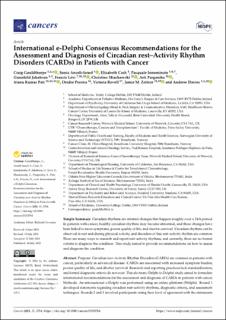| dc.contributor.author | Gouldthorpe, Craig | |
| dc.contributor.author | Ancoli-Israel, Sonia | |
| dc.contributor.author | Cash, Elizabeth | |
| dc.contributor.author | Innominato, Pasquale | |
| dc.contributor.author | Jakobsen, Gunnhild | |
| dc.contributor.author | Lévi, Francis | |
| dc.contributor.author | Miaskowski, Christine | |
| dc.contributor.author | Parganiha, Arti | |
| dc.contributor.author | Pati, Atanu Kumar | |
| dc.contributor.author | Pereira, Deidre | |
| dc.contributor.author | Revell, Victoria | |
| dc.contributor.author | Zeitzer, Jamie M. | |
| dc.contributor.author | Davies, Andrew | |
| dc.date.accessioned | 2023-11-03T13:38:59Z | |
| dc.date.available | 2023-11-03T13:38:59Z | |
| dc.date.created | 2023-09-01T11:52:36Z | |
| dc.date.issued | 2023 | |
| dc.identifier.citation | Cancers. 2023, 15 (15), . | en_US |
| dc.identifier.issn | 2072-6694 | |
| dc.identifier.uri | https://hdl.handle.net/11250/3100569 | |
| dc.description.abstract | Purpose: Circadian rest–Activity Rhythm Disorders (CARDs) are common in patients with cancer, particularly in advanced disease. CARDs are associated with increased symptom burden, poorer quality of life, and shorter survival. Research and reporting practices lack standardization, and formal diagnostic criteria do not exist. This electronic Delphi (e-Delphi) study aimed to formulate international recommendations for the assessment and diagnosis of CARDs in patients with cancer. Methods: An international e-Delphi was performed using an online platform (Welphi). Round 1 developed statements regarding circadian rest–activity rhythms, diagnostic criteria, and assessment techniques. Rounds 2 and 3 involved participants rating their level of agreement with the statements and providing comments until consensus (defined internally as 67%) and stability between rounds were achieved. Recommendations were then created and distributed to participants for comments before being finalized. Results: Sixteen participants from nine different clinical specialties and seven different countries, with 5–35 years of relevant research experience, were recruited, and thirteen participants completed all three rounds. Of the 164 generated statements, 66% achieved consensus, and responses were stable between the final two rounds. Conclusions: The e-Delphi resulted in international recommendations for assessing and diagnosing CARDs in patients with cancer. These recommendations should ensure standardized research and reporting practices in future studies. | en_US |
| dc.language.iso | eng | en_US |
| dc.publisher | MDPI | en_US |
| dc.rights | Navngivelse 4.0 Internasjonal | * |
| dc.rights.uri | http://creativecommons.org/licenses/by/4.0/deed.no | * |
| dc.title | International e-Delphi Consensus Recommendations for the Assessment and Diagnosis of Circadian rest–Activity Rhythm Disorders (CARDs) in Patients with Cancer | en_US |
| dc.title.alternative | International e-Delphi Consensus Recommendations for the Assessment and Diagnosis of Circadian rest–Activity Rhythm Disorders (CARDs) in Patients with Cancer | en_US |
| dc.type | Peer reviewed | en_US |
| dc.type | Journal article | en_US |
| dc.description.version | publishedVersion | en_US |
| dc.source.pagenumber | 0 | en_US |
| dc.source.volume | 15 | en_US |
| dc.source.journal | Cancers | en_US |
| dc.source.issue | 15 | en_US |
| dc.identifier.doi | 10.3390/cancers15153784 | |
| dc.identifier.cristin | 2171622 | |
| cristin.ispublished | true | |
| cristin.fulltext | original | |
| cristin.qualitycode | 1 | |

